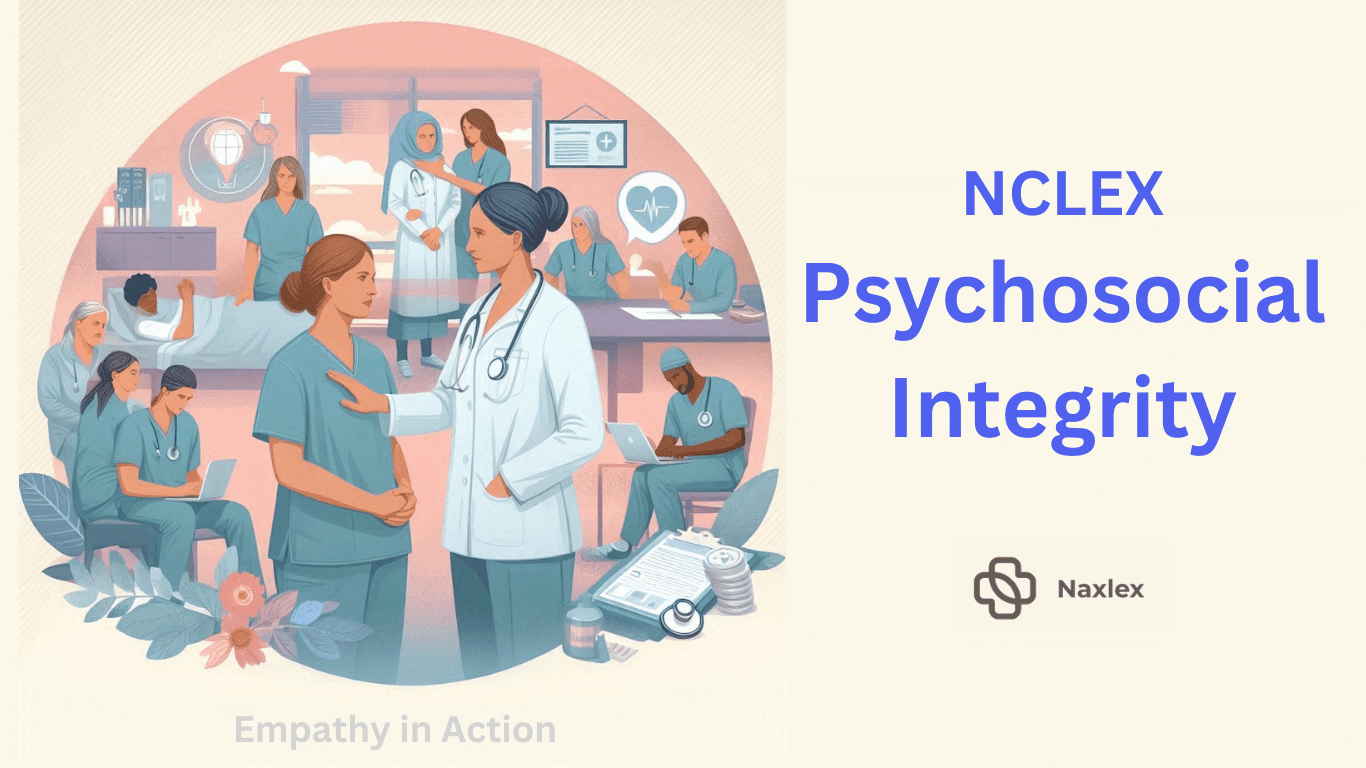Free NCLEX 14-day Free Trial
Try some exam questions on the NCLEX!
NCLEX Psychosocial Integrity
Psychosocial integrity, alongside physiological integrity, is crucial for overall health. It reflects a balance of psychological and social well-being, which can be disrupted by stress, illness, or crises. Threats to emotional, mental, and social health can upset this balance, leading to changes in adaptive and coping mechanisms. These changes may manifest in negative patterns of thinking, communication, emotions, and behaviors. Addressing psychosocial needs requires anticipating, recognizing, and analyzing these responses.
Struggling with psychosocial integrity? Start your NCLEX preparation with Naxlex NCLEX. Our trusted study materials have helped millions of nurses pass the NCLEX on their first try and excel in their careers. Study today using Naxlex NCLEX study guides, flashcards, test banks, and online tutoring to hone your NCLEX testing skills and grasp the concepts needed for the actual exam. Check out our packages here: NCLEX NGN Packages.

What to Expect in NCLEX Psychosocial Integrity Questions
Approximately 9% of NCLEX questions focus on Psychosocial Integrity. This section emphasizes promoting and supporting the emotional, mental, and social well-being of clients dealing with stressful situations and those with acute or chronic mental illnesses. Nursing actions in this category include:
Abuse/Neglect
This section addresses the Registered Nurse's responsibilities in assessing and reporting abuse and neglect. The RN evaluates clients and identifies risk factors for domestic violence, child abuse, elder abuse, neglect, and sexual abuse. Naxlex NCLEX helps students develop interventions for abuse victims, provide counseling, formulate coping strategies, ensure a safe environment, monitor client responses, and connect clients with community and mental health resources.
Family Dynamics
The psychosocial integrity section covering family dynamics addresses the role of the Registered Nurse. The RN assesses barriers and stressors affecting family dynamics, develops nursing care plans, evaluates parental disciplinary methods, encourages family or group therapy, supports integration of new family members, and identifies assets to enhance family functioning.
Behavioral Interventions
This section outlines behavioral interventions a Registered Nurse can implement. The RN evaluates clients' appearance, mood, and psychomotor activity, identifies inappropriate behaviors, orients clients to reality, supports behavior modification and self-control contracts, leads support groups and counseling sessions, applies behavioral management techniques, and assesses client responses to intervention plans.
Also read: NCLEX Health Promotion and Maintenance
Therapeutic Communication
Therapeutic communication covers essential aspects of nursing. The RN assesses client communication needs, respects values and beliefs, allocates time for effective communication, provides emotional support, facilitates expression of feelings, and evaluates communication effectiveness.
End-of-life Care
This section outlines essential nursing care for end-of-life provided by Registered Nurses (RNs). The RN identifies end-of-life needs, assesses client coping abilities, recognizes family support needs, provides psychosocial support to caregivers, assists with essential end-of-life matters, and educates clients.
Therapeutic Environment
This section addresses how Registered Nurses can foster therapeutic environments. The RN identifies factors hindering client recovery, arranges room assignments promoting a therapeutic atmosphere, and ensures supportive environments for clients with emotional and behavioral challenges.
Grief and Loss
Naxlex NCLEX study guides cover RN support for clients experiencing grief and loss. The RN helps clients navigate grief, dying, and mourning, supports during suffering and anticipatory grief, educates on grief responses, offers community resources, and assesses coping mechanisms.
Chemical and Other Dependencies/ Substance Use Disorder
This area discusses substance use disorders, chemical addictions, and dependencies. The RN assesses clients for dependencies or toxicities, provides care, evaluates client responses to treatment, plans care for withdrawal or toxicity, educates on substance abuse diagnosis and treatment, offers support for non-substance dependencies, manages withdrawal symptoms, encourages participation in support groups and rehabilitation services, and adjusts treatment plans.
Check Out: NCLEX Safe and Effective Care Environment
Mental Health Concepts
Naxlex NCLEX study materials cover essential mental health concepts for RNs. Nurses must understand psychiatric disorders such as anxiety, depression, bipolar disorder, dementia, eating disorders, and schizophrenia. They identify signs and symptoms, develop care plans, educate clients, recognize defense mechanisms, assess compliance with treatment, evaluate psychopathology, apply therapeutic modalities, and assess responses to aging.
Stress Management
Stress management focuses on techniques for RNs preparing for the NCLEX-RN exam. Nurses recognize stress cues, assess environmental stressors affecting care, implement stress reduction interventions, educate clients on stress management techniques like meditation, exercise, guided imagery, and relaxation, and assess client use of these techniques.
Cultural Awareness/Cultural Influences on Health
Naxlex NCLEX flashcards explore cultural awareness in health and nursing. The RN recognizes cultural influences on medical acceptance, integrates cultural practices into care, respects cultural backgrounds, uses interpreters, and supports client understanding and language needs.
Support Systems
This section covers healthcare support systems for RNs. The RN involves families in care planning for clients with impaired cognition, supports client healthcare management, and assesses client comfort and emotional response to treatment plans.
Sensory/Perceptual Alterations
This section covers sensory and perceptual alterations for RNs. Nurses recognize symptoms affecting sensory and cognitive functions, support client coping strategies, participate in care for visual, auditory, or cognitive disorders, and provide comforting care.
Crisis Intervention
Crisis intervention covers RN responsibilities in crisis management on the NCLEX. The RN assesses client violence risk, implements safety measures, identifies crises, applies intervention techniques, and connects clients with community support.
Religious and Spiritual Influences on Health
This psychosocial integrity section addresses RN understanding of religious and spiritual health influences. The RN identifies client emotional and spiritual needs, respects spiritual beliefs, integrates spiritual care into nursing, and evaluates spiritual support.
Coping Mechanisms
The coping mechanisms section discusses RN strategies for client wellness. The RN assesses client resources and adaptations, supports role changes, evaluates client mental health responses, offers coping support, identifies triggers, and assesses coping effectiveness.
More articles:
Winding Up
Explore Naxlex NCLEX for comprehensive test banks and study guides. Prepare with Naxlex NCLEX to succeed in your nursing career. Visit our site for affordable psychosocial integrity prep resources, including practice tests and expert answers. Choose the best Naxlex NCLEX package for your study needs today.
Naxlex NCLEXPass on the first time!
Struggling to pass the NCLEX exam?
With questions that are almost 90% similar to actual
exams
you will be guaranteed to
pass it on first try .

FAQs
If you use the Nursing test guide PDF, you will enjoy features like:
Images
for effective visual learning
Summarized detailed topics
Quick
reading with footnotes
Questions to help you study through
trial and error
Get
ready for the Nursing with confidence
